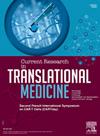CAR-iNKT细胞疗法:机制、优势和挑战。
IF 3
4区 医学
Q2 MEDICINE, RESEARCH & EXPERIMENTAL
引用次数: 0
摘要
近年来,嵌合抗原受体(CAR) t细胞治疗已成为癌症免疫治疗的一种突破性方法。特别是在血液恶性肿瘤,如B细胞急性淋巴细胞白血病(B- all), B细胞淋巴瘤和多发性骨髓瘤。CAR-T疗法已经显示出显著的临床疗效,导致几种CAR-T细胞产品被批准,并为众多白血病患者提供了显着的益处。尽管取得了这些成功,CAR-T细胞在实体肿瘤中的应用仍然有限,因为存在重大挑战,包括免疫抑制肿瘤微环境、异质抗原表达和治疗相关的毒性。在CAR-T发展的同时,研究人员正在研究其他免疫细胞平台来克服这些障碍。其中,不变性自然杀伤T细胞(iNKT)因其独特的免疫学特性而受到越来越多的关注。与传统T细胞不同,iNKT细胞是T淋巴细胞的一个亚群,其特征是一个半不变T细胞受体(TCR)的表达,该受体识别CD1d分子呈递的脂质抗原。这种独特的抗原识别机制使iNKT细胞能够架起先天免疫和适应性免疫的桥梁,赋予它们强大的抗肿瘤活性和调节肿瘤微环境的能力。此外,与传统的T细胞相比,iNKT细胞表现出固有的抗衰竭和浸润实体肿瘤的能力增强。基于这些特性,研究人员正在利用CAR技术来增强iNKT细胞肿瘤靶向能力,旨在克服实体肿瘤治疗中遇到的障碍。本文对CAR-iNKT细胞在癌症免疫治疗中的应用和治疗潜力进行了深入的讨论,重点讨论了CAR-iNKT细胞相对于传统CAR-T细胞的优势及其在解决实体肿瘤治疗挑战中的作用。本文章由计算机程序翻译,如有差异,请以英文原文为准。
CAR-iNKT cell therapy: mechanisms, advantages, and challenges
In recent years, chimeric antigen receptor (CAR) T-cell therapy has emerged as a groundbreaking approach in cancer immunotherapy. Particularly in hematologic malignancies, such as B-cell acute lymphoblastic leukemia (B-ALL), B cell lymphomas and multiple myeloma. CAR-T therapy has demonstrated remarkable clinical efficacy, leading to the approval of several CAR-T cell products and offering significant benefits to numerous leukemia patients. Despite these successes, the application of CAR-T cells in solid tumors remains limited due to significant challenges, including immunosuppressive tumor microenvironments, heterogeneous antigen expression, and treatment-associated toxicities. In parallel with CAR-T development, researchers are investigating other immune cell platforms to overcome these obstacles. Among these, invariant natural killer T (iNKT) cells have garnered increasing attention for their unique immunological properties. Unlike conventional T cells, iNKT cells are a subset of T lymphocytes characterized by the expression of a semi-invariant T-cell receptor (TCR) that recognizes lipid antigens presented by CD1d molecules. This distinctive antigen recognition mechanism enables iNKT cells to bridge innate and adaptive immunity, granting them potent antitumor activity and the ability to modulate the tumor microenvironment. Additionally, iNKT cells exhibit intrinsic resistance to exhaustion and an enhanced ability to infiltrate solid tumors compared to traditional T cells. Building on these properties, researchers are leveraging CAR technology to enhance iNKT cell tumor-targeting capabilities, aiming to overcome barriers encountered in solid tumor therapy. This review provides an in-depth discussion of the application and therapeutic potential of CAR-iNKT cells in cancer immunotherapy, with a focus on their advantages over conventional CAR-T cells and their role in addressing the challenges of solid tumor treatment.
求助全文
通过发布文献求助,成功后即可免费获取论文全文。
去求助
来源期刊

Current Research in Translational Medicine
Biochemistry, Genetics and Molecular Biology-General Biochemistry,Genetics and Molecular Biology
CiteScore
7.00
自引率
4.90%
发文量
51
审稿时长
45 days
期刊介绍:
Current Research in Translational Medicine is a peer-reviewed journal, publishing worldwide clinical and basic research in the field of hematology, immunology, infectiology, hematopoietic cell transplantation, and cellular and gene therapy. The journal considers for publication English-language editorials, original articles, reviews, and short reports including case-reports. Contributions are intended to draw attention to experimental medicine and translational research. Current Research in Translational Medicine periodically publishes thematic issues and is indexed in all major international databases (2017 Impact Factor is 1.9).
Core areas covered in Current Research in Translational Medicine are:
Hematology,
Immunology,
Infectiology,
Hematopoietic,
Cell Transplantation,
Cellular and Gene Therapy.
 求助内容:
求助内容: 应助结果提醒方式:
应助结果提醒方式:


